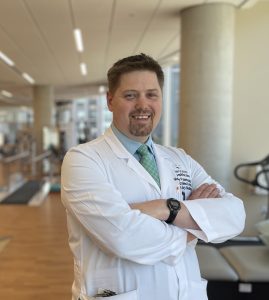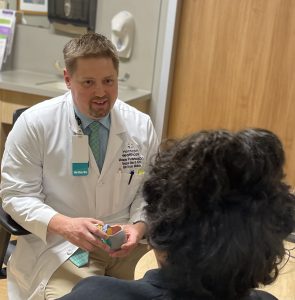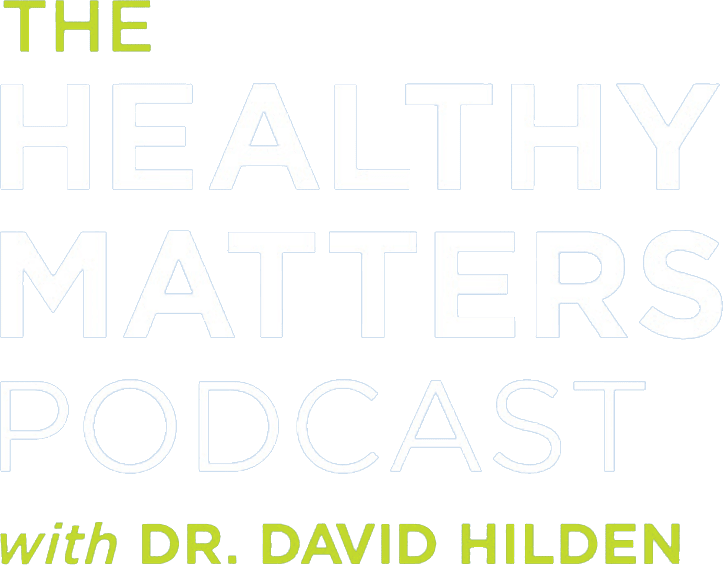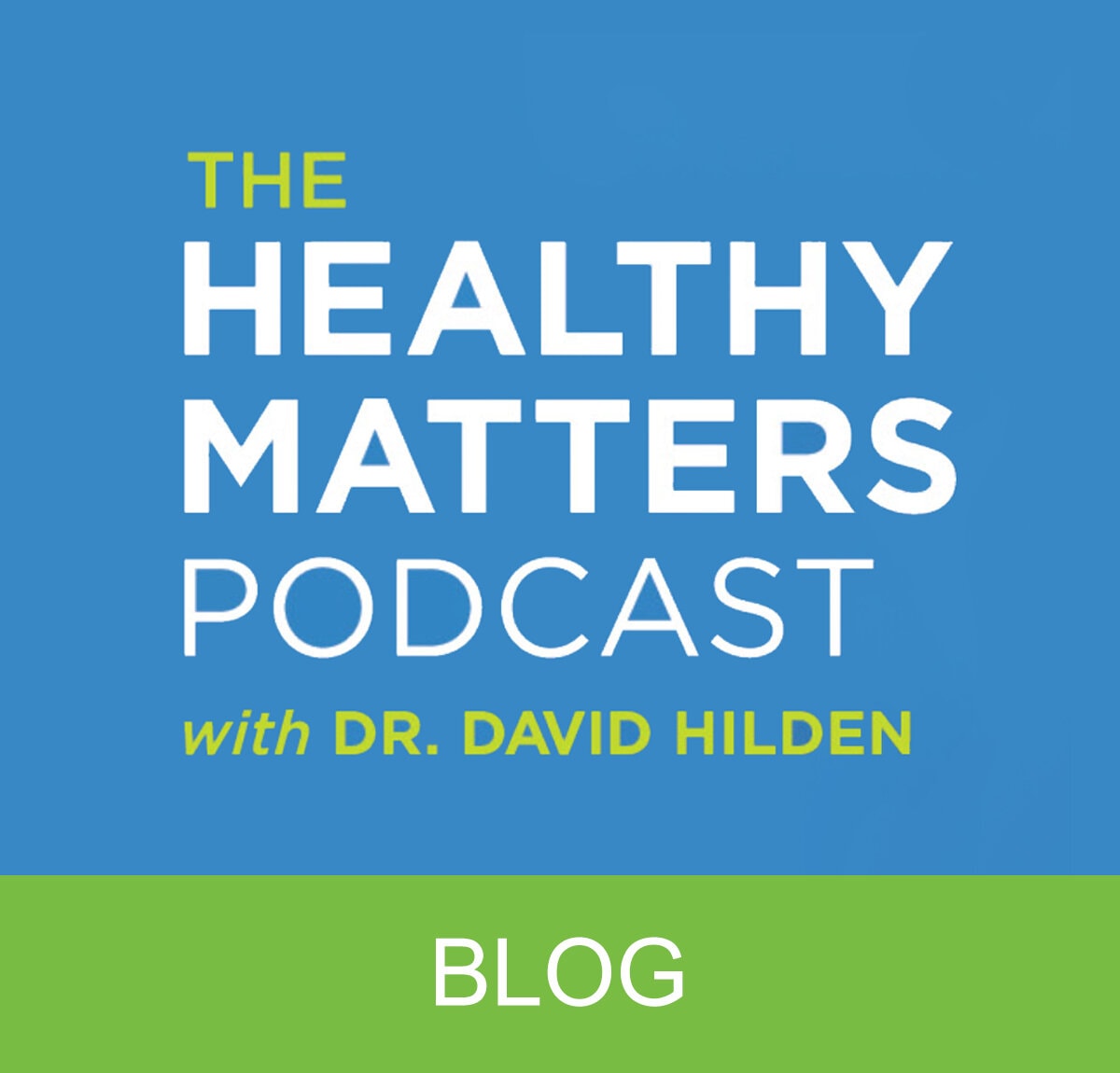Getting our brains around TBI and concussions
 We’ve all experienced a bump to the head, and not only does it hurt like heck – really “having our bell rung” can have serious consequences. On Episode Eight of the Healthy Matters podcast, I talked to Dr. Matthew Puderbaugh from our Traumatic Brain Injury – or TBI – Clinic, which was recently recognized as being the first in the world to receive special accreditation for its concussion program.
We’ve all experienced a bump to the head, and not only does it hurt like heck – really “having our bell rung” can have serious consequences. On Episode Eight of the Healthy Matters podcast, I talked to Dr. Matthew Puderbaugh from our Traumatic Brain Injury – or TBI – Clinic, which was recently recognized as being the first in the world to receive special accreditation for its concussion program.
Dr. Puderbaugh is a physical medicine and rehabilitation physician at Hennepin Healthcare and a veteran of the United States Air Force. He cares for many patients with TBIs, including professional athletes. To help us better understand these injuries, he shared the CDC’s description of a TBI:
“The CDC defines a TBI is some sort of disturbance of brain function that is due to a bump, jolt or penetrating injury to the brain.”
When I asked if that also describes a concussion, he said that a concussion is indeed a type of traumatic brain injury, that’s often referred to as a mild traumatic brain injury:
“Almost 50% of Americans have sustained a concussive event or a brain injury within their lifetimes – with the most common cause being sports injuries.”
Falls are also to blame for concussions. Dr. Puderbaugh says that they are the most common cause for sending someone to the hospital – especially during the winter months. Our hard, thick skulls are apparently no match for Minnesota ice when it comes to protecting our gelatinous brains.
So, what exactly happens to the brain during a TBI? Dr. Puderbaugh said that there’s two main pathological forces that are going on. One is that when you do strike the head – just like bumping any other part of your body – you’ll get a bruise. A brain bruise.
“The other part is that there’s oftentimes some sort of force that twists or stretches the brain a little bit, and that causes a diffuse injury that often causes us to feel this overwhelming sense of the brain not moving right – not performing the way it wants to.”
According to Dr. Puderbaugh, the most common TBI symptom is headache. Dizziness is the second most common symptom. When assessing patients, he asks them if they’ve lost consciousness, memory, saw stars, or felt dazed.
Most mild traumatic brain injuries and concussions resolve relatively quickly, “but for some people they still have persistent symptoms that can last for months to years afterwards, and it’s hard to predict who might be in that category.”
 Getting the right diagnosis and treatment for a brain injury is essential to any type of recovery. Hennepin Healthcare’s TBI team surrounds patients with the right specialists – everyone from therapists to physicians, psychologists and eye specialists – to address every aspect of the injury. Be sure to listen to the podcast to learn more about the consistency of our brains, what to do if you suspect a TBI and how to avoid being sidelined by a concussion.
Getting the right diagnosis and treatment for a brain injury is essential to any type of recovery. Hennepin Healthcare’s TBI team surrounds patients with the right specialists – everyone from therapists to physicians, psychologists and eye specialists – to address every aspect of the injury. Be sure to listen to the podcast to learn more about the consistency of our brains, what to do if you suspect a TBI and how to avoid being sidelined by a concussion.
Keeping up with pacemakers
In Episode 11 of the Healthy Matters Podcast, I enjoy an electrifying conversation with electrophysiologist Dr. Rehan Karim about pacemakers. He’s a cardiologist who specializes in the electrical systems of your heart. Why do some people need pacemakers? What exactly do they do?
“In simplistic terms, the only job of a pacemaker is to prevent the heart from going too slow,” explained Dr. Karim. “If someone’s heart rate is very slow, they are going to have symptoms like feeling dizzy or lightheaded. The pacemaker’s main task is to make sure that it’s providing a minimum heart rate.”
So it sets the pace. That’s where we get the term, “pacemaker.” In addition to feeling dizzy, Dr. Karim said that people can pass out and injure themselves if their heart decides to slow down and not beat – even for a few seconds.
“Sometimes when there’s an electrical problem, the heart rate doesn’t increase appropriately in scenarios when it should increase with exertion,” he said. “This can also make people feel very fatigued.”
Dr. Karim mentioned how in adults aged seventy-five or older, more than 2,500 out of one hundred thousand may end up needing pacemakers. “You can think of it this way: as time passes by, the electrical wiring tends to get worn out and may need some extra support.”
The same-day procedure for pacemaker placement is not extremely complicated, and usually takes about an hour.
“For comfort, patients are given a mild to moderate degree of sedative drugs to make sure they’re not having too much pain,” said Dr. Karim. “So, we give local anesthesia, and the incision may be about two to three finger breadths. Patients may feel a slight pushing and tugging kind of sensation on the skin. And you know how they say all roads lead to Rome? Well all veins go to the heart. So basically, you get access to a large vein under the collarbone, thread a couple of wires into the heart, and those wires have a little screw at the tip. The screw is then secured into the heart muscle.”
Dr. Karim wants patients to take away three important messages about pacemakers from this podcast:
- Pacemakers are there to treat your symptoms, not to “set” a specific number for your heart rate, for example.
- Pacemakers can make a big difference in someone’s life and people can lead as normal of a life as possible with them.
- There are a lot of resources available if you have any questions. He recommends the Heart Rhythm Society. They have a website for patients called upbeat.org which has a lot of information about heart rhythm disorders in general.
More about what to expect during and post-procedure, the future of pacemakers, and great questions and answers about microwaving oatmeal and airport security are discussed in Episode 11 of the Healthy Matters Podcast.
Pediatrics! Where it all begins…
Kids don’t come with a guidebook? In Episode One of Season 2 of the Healthy Matters Podcast we have the next best thing – Dr. Krishnan Subrahmanian, pediatrician at Hennepin Healthcare! We talk about RSV and other viral illnesses, early childhood development, reading and language development, and how to access your child’s pediatrician. (Warning: This is snot an episode for those who get queasy hearing the word “booger.”)
Dr. Krish – as he often is called – was a high school special education teacher before he became a pediatrician.
“The kids were incredible. They were amazing. They inspired me. They made me think, they challenged me. And I honestly loved my job as a special education teacher. My hats and heart go off to all the special education teachers out there. They do incredible work.”
This love of learning spills over into his work as a pediatrician, and Dr. Krish’s interest in brain development – especially at an early age.
“Actually 90 to 95% of brain development – neuronal connections – has happened by the age of five,” he explains. “And it leads us to think, ‘wait a minute, what are we doing in those early years to help support that brain development to get kids off to the best start?’ What this means is that even pre-birth in utero, brain development is starting, and neuronal connections in those first few months and years of life are growing every day.”
Dr. Krish explains how playing with children, talking to children, and singing with children helps form a brain that is more able to learn, more able to grow, and sets them up for success for the rest of their lives.
“There’s a type of interaction called serve and return learning,” he shared. “It’s the kind of thing that you see folks do all the time. ‘Hey, baby, how you doing? How’s it going?’ And then waiting for that little response, that smile or that cue back from the baby. That kind of communication pattern, giving a little bit to the baby, waiting for the return and, and ensuring that we do that repeatedly, really does help form brain connections and can begin right from the very moment that they join your family.”
While Dr. Krish and I talk about ways to relieve nasal congestion, reduce fever, and when to bring your child in to be seen by a physician he also gives this piece of advice for the well-being of children, which is very worthy of sharing:
“The greatest tool and gift we have for little babies and kids is an adult who loves them, is an adult who cares for them, is an adult who’s investing their time and energy. If you can spend yourself, your time, your energy, that will make the biggest difference.”
Wise words indeed. Thanks for listening to Episode One of Season 2 of the Healthy Matters Podcast!

